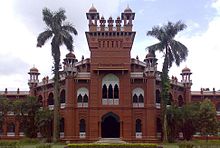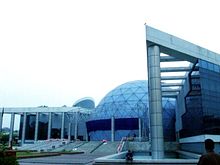Dhaka has the largest number of schools, colleges and universities of any Bangladeshi city. The education system is divided into 4 levels: Primary (from grades 1 to 5), Secondary (from grades 6 to 10), Higher Secondary (from grades 11 to 12) and tertiary.[89] The five years of lower secondary education concludes with a Secondary School Certificate (SSC) Examination. Students who pass this examination proceed to two years of Higher Secondary or intermediate training, which culminate in a Higher Secondary Certificate (HSC) Examination.[89] Education is mainly offered in Bangla, but English is also commonly taught and used. A large number of Muslim families send their children to attend part-time courses or even to pursue full-time religious education, which is imparted in Bangla and Arabic in madrasahs.[89]
There are 52 universities in Dhaka. The Dhaka College is the oldest institution of higher education in the city and amongst the earliest established in British India, founded in 1840. Since independence, Dhaka has seen the establishment of a large number of public and private colleges and universities that offer undergraduate and graduate degrees as well as a variety of doctoral programmes.[90] TheUniversity of Dhaka is the largest public university[91] in the nation with more than 30,000 students and 1,300 faculty staff. The university has 18 research centres and 70 departments, faculties and institutes.[92] Eminent seats of higher education include the Jagannath University, Jahangirnagar University and the Bangladesh University of Engineering and Technology (BUET). The Dhaka Medical College and the Sir Salimullah Medical College are amongst the largest and most respected medical schools in the nation.[93] Dhaka's college campuses are often hotbeds of political conflicts.[94] Protests and strikes, and violence amongst police, students and political groups frequently disrupt public university campuses.[95][96]
Alongside public institutes of higher education there are some forty-five private universities in Dhaka. Notable private universities includeAmerican International University - Bangladesh (AIUB), North South University(NSU), BRAC University and East West University (see:List of universities in Bangladesh), most of which are located in Mohakhali, Gulshan, Banani, Bashundhara and Dhanmondi areas of the city.
The British Council plays an important role helping students to achieve GCE 'O' Level and 'A' Level qualifications from British Examination Boards. This is in addition to holding several examinations for professional bodies in the United Kingdom, including the UK medical Royal Colleges and Accountancy.

